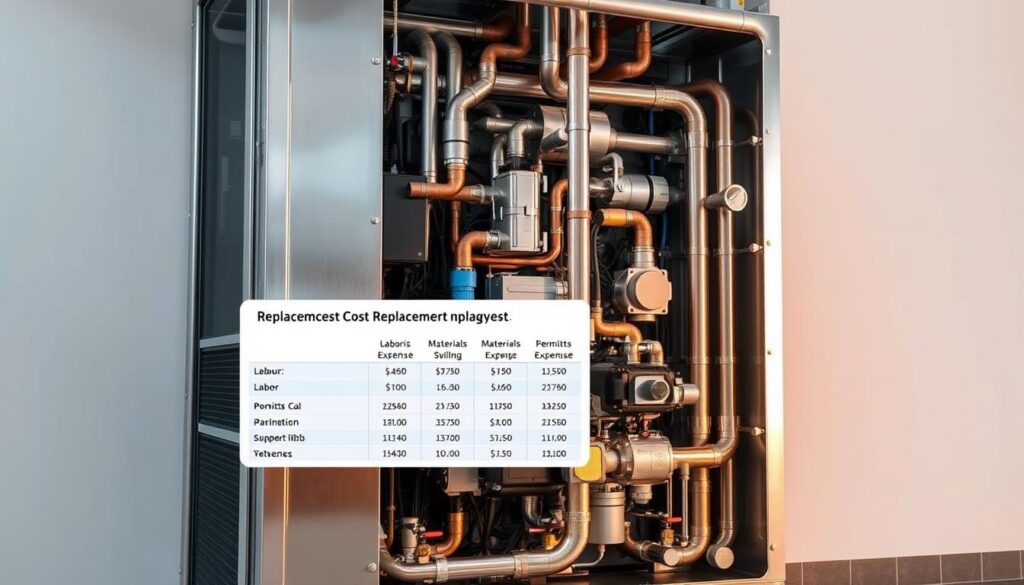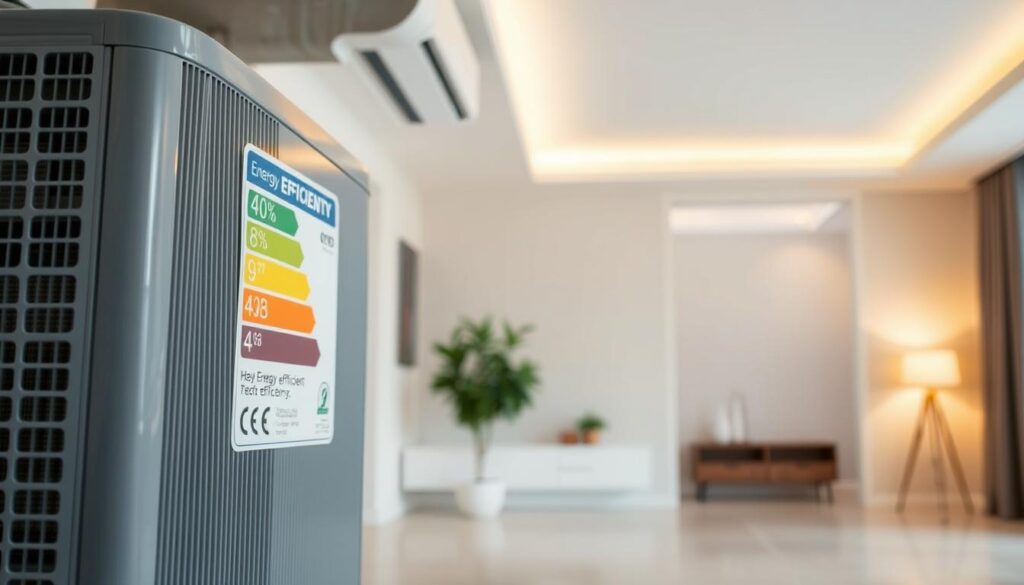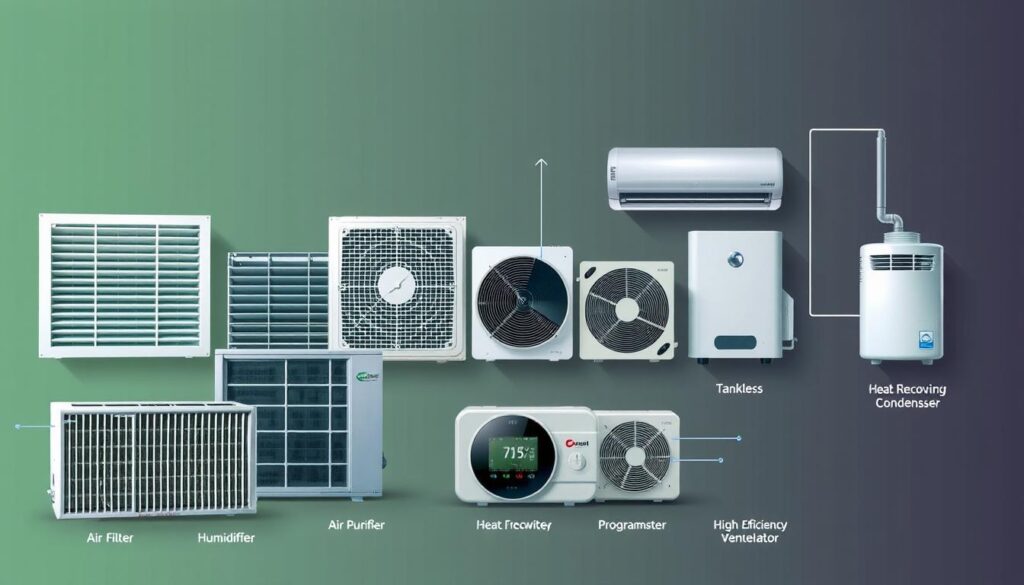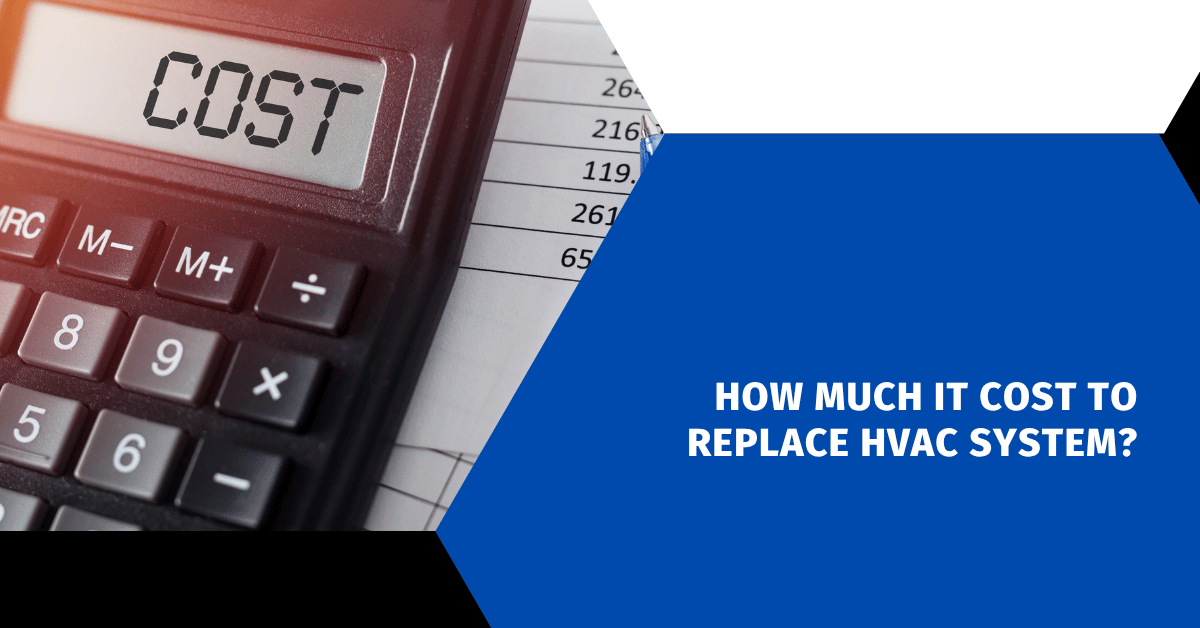Affiliate Disclosure
HVAC Guide Guys is a participant in the Amazon Services LLC Associates Program, an affiliate advertising program designed to provide a means for sites to earn advertising fees by advertising and linking to Amazon.
How Much Does It Cost to Replace HVAC System? Ever wondered why homeowners cringe when their HVAC system starts making strange noises? The real shock comes when you discover the cost to replace it. It can range from $3,000 to $7,500 for a central air conditioning system.

Knowing the cost to replace your HVAC system is key for every homeowner. Your heating and cooling system does more than just keep you comfortable. It’s a big investment that affects your home’s comfort, energy use, and your monthly bills.
Modern HVAC systems do more than control temperature. They are a complex network of technologies. They aim to improve your living space and save you money over time.
Key Takeaways
- HVAC replacement costs vary widely based on system type and home size
- Central air conditioning systems typically range from $3,000 to $7,500
- Professional assessment is critical before making a replacement decision
- Energy efficiency can offset initial installation expenses
- Regional climate significantly impacts HVAC system selection
Table of Contents
Understanding HVAC System Replacement Basics
Your home’s comfort depends on a good HVAC system. Knowing about HVAC unit replacement helps you make smart choices for your home’s heating and cooling. If you’re seeing high energy bills or need constant repairs, it’s time to think about replacing your HVAC system.
What Defines an HVAC System
An HVAC system is more than one unit. It’s a complex system that keeps your home’s temperature and air quality right. It includes:
- Heating equipment (furnace or heat pump)
- Cooling unit (air conditioner)
- Ventilation ductwork
- Thermostat controls
When to Consider System Replacement
Knowing when to get a new HVAC system can save you money. Look out for these signs:
- System age over 10-15 years
- Frequent and costly repairs
- Significant increase in energy bills
- Inconsistent room temperatures
Benefits of Modern HVAC Systems
Getting a new HVAC system has big benefits. Modern systems are more energy-efficient, which can lower your costs. They also come with:
| Feature | Benefit |
|---|---|
| Smart Thermostats | Precise temperature control |
| Variable Speed Motors | Enhanced energy efficiency |
| Improved Air Filtration | Better indoor air quality |
Tip: Always consult with a professional HVAC technician to determine the most suitable replacement strategy for your specific home needs.
Average HVAC Replacement Cost Overview
Knowing the average cost for a new central air conditioner is key to planning your budget. Homeowners usually spend between $6,000 and $8,000 for a basic system swap, not including ductwork.
For a full HVAC setup, expect to spend more. A complete system with new ducts can cost between $15,000 and $25,000. The price of a new furnace depends on several things:
- Home size and square footage
- System efficiency ratings
- Local labor rates
- Complexity of installation
Your final bill will depend on many factors. Things like energy efficiency, the brand you choose, and where you live can change the cost a lot. A professional HVAC contractor can give you a detailed estimate based on your home’s needs.
Pro tip: Always get multiple quotes and compare system specifications before making a final decision.
Getting a new HVAC system is more than just the upfront cost. It can also save you money on your bills and make your home more valuable.
Explore Our HVAC Shop
Looking for top-rated HVAC tools, parts, and accessories? Visit our shop and find the perfect solution for your needs.
Visit the ShopHow Much Does It Cost to Replace HVAC System in Different Home Types
HVAC replacement costs change a lot based on your home type. Knowing the costs for different homes and businesses helps you plan better for your new heating and cooling system.
The size and layout of your home are key in figuring out HVAC replacement costs. Each home type needs a special way to install and replace the system.
Single-Family Home Costs
For single-family homes, the cost to replace the HVAC system is usually between $5,000 and $10,000. Several things affect the price, including:
- The home’s square footage
- The condition of the ductwork
- How energy-efficient you want the system
- The local weather
Townhouse Installation Expenses
Replacing the HVAC in townhouses can be tricky. Shared walls and tight spaces make it harder and more expensive. Townhouse HVAC replacements cost between $4,500 and $8,500.
Commercial Property Considerations
Commercial HVAC replacements are much more expensive than home ones. They need bigger systems, more complex setups, and meet specific business needs, which raises the cost.
| Property Type | Average Cost Range | Installation Complexity |
|---|---|---|
| Small Retail Space | $10,000 – $15,000 | Moderate |
| Office Building | $20,000 – $50,000 | High |
| Industrial Facility | $50,000 – $100,000 | Very High |
Pro tip: Always get multiple commercial HVAC replacement estimates to ensure competitive pricing and complete service coverage.
Key Factors Affecting HVAC Installation Costs
Understanding the details of hvac system upgrade costs is key to smart home comfort investments. Many factors influence the cost of replacing your HVAC system.
Your home’s specific features greatly affect the total cost of upgrading your HVAC. Important factors include:
- Home size and square footage
- Existing ductwork condition
- Local climate requirements
- Energy efficiency goals
- Equipment quality and brand
Contractors look at several key elements when figuring out costs. The complexity of your home’s layout can greatly impact labor costs and system design needs.
| Factor | Impact on Cost | Estimated Variation |
|---|---|---|
| Home Size | Direct correlation | 20-50% price change |
| Climate Zone | System type selection | 15-35% cost adjustment |
| Energy Efficiency | Long-term savings | 10-25% initial investment |
Professional installation teams consider these factors to give accurate estimates for your specific hvac system upgrade cost. Spending time to understand these elements can help you budget well and choose the right system for your home.
Pro tip: Always get multiple quotes and compare detailed assessments from certified HVAC professionals.
While upfront costs are important, choosing a high-quality system that fits your home’s needs can save you money in the long run. It also improves your home’s comfort.
Explore Our HVAC Shop
Looking for top-rated HVAC tools, parts, and accessories? Visit our shop and find the perfect solution for your needs.
Visit the ShopTypes of HVAC Systems and Their Price Ranges
Choosing the right HVAC system is key to your home’s comfort and your wallet. Each system has its own benefits and costs. Knowing these options helps you find the best balance between performance and price.
Central Air Conditioning Systems
Central air conditioning is a top pick for cooling your whole home. The cost to replace your HVAC with this system is between $3,500 and $7,500. This depends on your home’s size and needs.
- Ideal for whole-house cooling
- Provides consistent temperature control
- Works with existing ductwork
Heat Pump Systems
Heat pumps are great for both heating and cooling. They’re often more energy-efficient than other systems. The cost to install a heat pump ranges from $3,000 to $10,000.
| Type of Heat Pump | Average Cost | Key Benefits |
|---|---|---|
| Air-Source Heat Pump | $4,000 – $7,000 | Good for moderate climates |
| Geothermal Heat Pump | $10,000 – $25,000 | Highest energy efficiency |
Furnace Options
Furnaces are reliable for heating your home. They come in different types and efficiencies. The cost to install a new furnace is between $2,500 and $6,000.
- Gas Furnaces: Most common, lower initial cost
- Electric Furnaces: Higher operating expenses
- Oil Furnaces: Less common, regional variations
Pro Tip: Always consider your local climate and home size when selecting an HVAC system to maximize efficiency and minimize long-term costs.
Energy Efficiency and Cost Implications

When you think about replacing your HVAC unit, energy efficiency is key. Modern systems can cut down on energy costs over time. This is thanks to new tech and better performance ratings.
Knowing about efficiency ratings helps you choose wisely. Look at:
- SEER (Seasonal Energy Efficiency Ratio) for cooling
- AFUE (Annual Fuel Utilization Efficiency) for heating
Higher ratings mean lower bills. For example, a SEER of 16 or more can cut cooling costs by up to 40%. This is compared to older, less efficient models.
| Efficiency Rating | Estimated Annual Savings | Payback Period |
|---|---|---|
| SEER 14 | $100-$200 | 5-7 years |
| SEER 18 | $250-$450 | 3-5 years |
| SEER 22+ | $500-$700 | 2-4 years |
Many places offer rebates and incentives for efficient HVAC systems. These can help cover the cost of a new system. This makes energy-efficient models a smart choice for the long run.
“Investing in an energy-efficient HVAC system is not just about immediate comfort, but about sustainable cost savings for years to come.” – Energy Efficiency Expert
Explore Our HVAC Shop
Looking for top-rated HVAC tools, parts, and accessories? Visit our shop and find the perfect solution for your needs.
Visit the ShopHVAC Installation Labor Costs and Timeframes
When planning a new HVAC system, it’s key to understand labor costs and installation time. The cost of replacing your HVAC can change a lot. This depends on several important factors that affect professional installation.
Installing an HVAC system needs special skills and care. The price for a new HVAC includes the cost of expert labor. This ensures your system works well and safely.
Professional Installation Requirements
Installing an HVAC system is not a job for DIYers. Certified technicians are essential. They make sure:
- Your home gets the right-sized system
- Electrical connections are done right
- The refrigerant is charged correctly
- Ductwork is set up perfectly
Timeline Expectations
How long it takes to install depends on the project’s complexity. Here’s what you can expect:
- Simple replacement without ductwork: About 1 day
- Full system installation with ductwork: 3-5 days
Several things can affect how long it takes to install. These include your home’s size, the system’s complexity, and what’s already there. Getting a professional to assess your needs helps. They can give you a more accurate timeline for your HVAC replacement cost and installation.
Ductwork Considerations and Costs
When planning to upgrade your HVAC system, don’t forget about ductwork. It’s a key part that many homeowners often ignore. Your current ductwork can greatly affect your new system’s efficiency and cost.
Ductwork is like your home’s air highway. It carries cooled or heated air to every room. If your ducts are old or damaged, your system won’t work well. This can make your energy bills go up and your home less comfortable.
- Typical ductwork installation ranges from $6,000 to $10,000
- Older homes often need new ducts
- Right duct size is key for system performance
How good your ductwork is will decide if you need to replace some or all of it. HVAC experts can check your ducts for:
- Air leaks
- Insulation quality
- Sealing
- Airflow capacity
Getting new ductwork that’s top-notch can save you money on energy in the long run. Your new ducts should be well-sealed, insulated, and the right size for your HVAC system.
Proper ductwork is as important as the HVAC unit itself for system efficiency.
When planning your HVAC upgrade, make sure to get a professional to check your ductwork. This will help avoid extra costs and ensure your system works its best.
Explore Our HVAC Shop
Looking for top-rated HVAC tools, parts, and accessories? Visit our shop and find the perfect solution for your needs.
Visit the ShopAdditional Components and Add-ons
When you’re planning to replace your HVAC unit, think about adding extra components. These can make your system work better and make your home more comfortable. While they might cost more upfront, they can save you money and improve the air quality in the long run.

Today’s HVAC systems offer many ways to upgrade your home’s comfort and air management. Adding smart technologies and improving air quality can change how you live.
Smart Thermostats and Controls
Smart thermostats are a smart choice for your HVAC replacement. They offer many benefits:
- Remote temperature control via smartphone apps
- Energy consumption tracking
- Automated temperature adjustments
- Potential energy savings up to 15%
Brands like Nest and Ecobee have advanced options. They cost between $200 to $500 and work well with modern HVAC systems.
Air Quality Improvements
Improving indoor air quality is key when you replace your HVAC system. Important add-ons include:
- Whole-house air purifiers
- Advanced filtration systems
- Humidity control devices
- UV light air sanitizers
Whole-house humidifiers cost about $300-$500, including installation. They help reduce allergens, control moisture, and make your home healthier.
Selecting the right add-ons can transform your HVAC system from a basic temperature control solution to a complete home comfort management system.
Regional Price Variations and Climate Factors
The cost of replacing your home’s HVAC system can change a lot based on where you live in the U.S. The climate you’re in affects how much you’ll need to spend.
Different places face unique weather challenges. This affects what kind of HVAC system you need and how much it costs. For example, homes in the Southwest need stronger cooling systems. In contrast, homes in the Northeast require more powerful heating systems.
- Southern states: Higher cooling demands increase residential hvac replacement pricing
- Northern regions: More expensive heating-focused systems
- Coastal areas: Systems must withstand humidity and salt exposure
Local building codes and energy rules also play a big role in costs. Cities often have rules about how efficient your HVAC system must be. This can mean you’ll need to spend more on your new system.
Things to consider include:
- Temperature extremes
- Humidity levels
- Seasonal weather patterns
- Local energy efficiency requirements
Pro tip: Always talk to local HVAC experts who know your area’s specific needs. They can give you the best estimate for replacing your HVAC system.
Explore Our HVAC Shop
Looking for top-rated HVAC tools, parts, and accessories? Visit our shop and find the perfect solution for your needs.
Visit the ShopExplore Our HVAC Shop
Looking for top-rated HVAC tools, parts, and accessories? Visit our shop and find the perfect solution for your needs.
Visit the ShopFinancing Options and Rebate Programs
Replacing your HVAC system is a big deal, but there are ways to make it easier. You can find financing options that help spread out the cost. This makes upgrading your home’s comfort more doable and less expensive.
There are several ways to lower the cost of a new HVAC system:
- Manufacturer Financing Programs
- Personal Home Improvement Loans
- Energy Efficiency Rebates
- Government Incentive Programs
Government rebate programs can save you a lot of money. The U.S. Department of Energy offers tax credits up to $500 for energy-efficient home upgrades. Plus, local utility companies often have extra incentives that can cut down the cost even more.
Looking into financing options can also help lower what you pay upfront:
- Home Equity Lines of Credit (HELOC)
- Energy-Efficient Mortgages
- Manufacturer Financing with Promotional Rates
- Personal Unsecured Loans
Some credit unions and banks offer green home improvement loans with good rates. When you’re looking at financing, compare the terms, interest rates, and tax benefits. This will help you find the best deal for your budget.
Pro Tip: Always check the latest rebate programs and financing options with local energy offices and manufacturers.
Using these financial tools can help you manage the cost of a new HVAC system. You’ll also be improving your home’s comfort and energy use.
Conclusion
Figuring out the cost to replace an HVAC system involves looking at several factors. Your home’s needs, energy goals, and budget are key. These help decide the best HVAC replacement for you.
The cost to replace an HVAC system changes based on your home’s size, climate, and system needs. Getting a pro to install it and choosing energy-saving tech can lower costs. Looking into different options, financing, and getting quotes helps you understand the upgrade process.
Choosing the right HVAC system means balancing initial costs and long-term savings. Modern systems improve performance, cut down on energy bills, and make your home more comfortable. Talking to licensed HVAC pros can give you advice that fits your home and budget.
Investing in a good HVAC system is more than just the upfront cost. It’s about making your home comfortable and efficient for years. Take your time to look at your choices, think about long-term benefits, and pick what’s best for your home.

